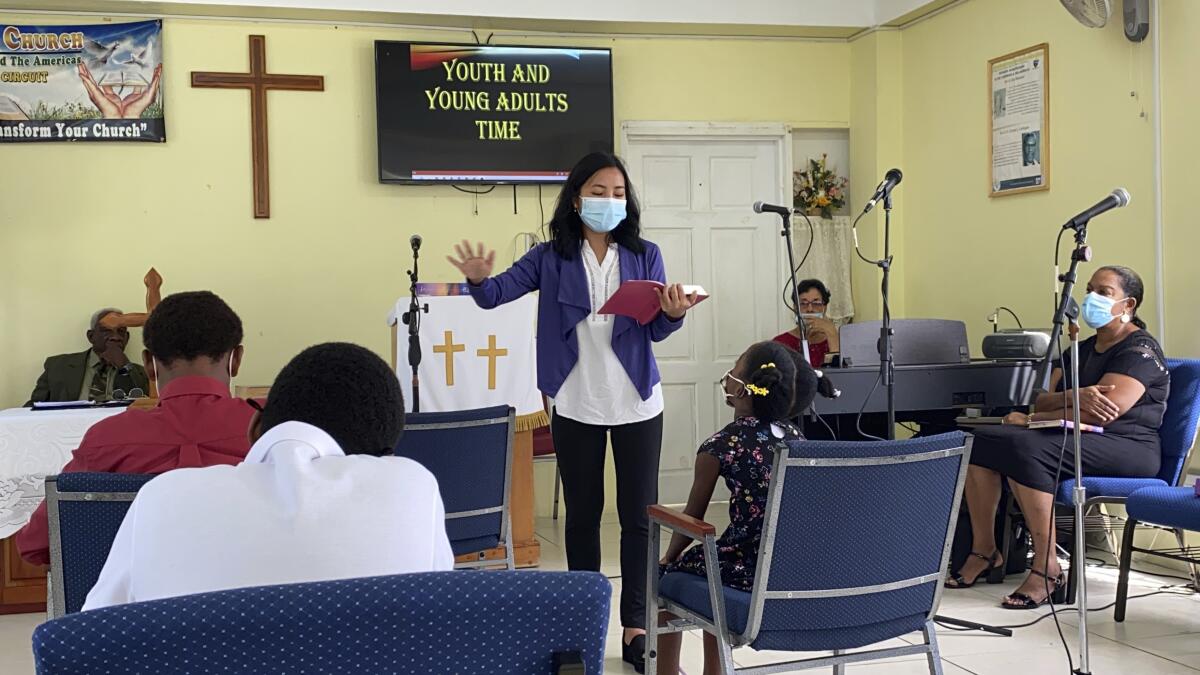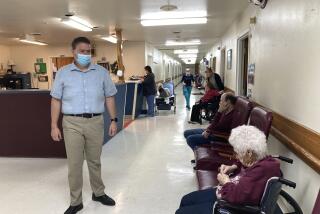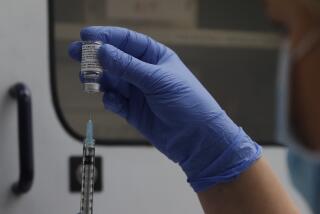Southern Baptist Convention mandates COVID-19 vaccine for its missionaries

- Share via
COVID-19 vaccine refusal rates may be high among white evangelicals, but the International Mission Board — which deploys thousands of missionaries — is not hesitant about the shot.
The global agency of the Southern Baptist Convention, the largest evangelical Protestant denomination in the U.S., announced this month it is requiring vaccinations for missionaries going into the field amid the pandemic.
The IMB may be the first U.S. missionary agency to have such a mandate, according to leaders in the field, as other faith groups approach the issue in a variety of ways, including limiting where people can serve and making considerations for uneven global access to the vaccines.
“This is a very common-sense decision,” said Ed Stetzer, a Southern Baptist who is dean of Mission, Ministry and Leadership at Wheaton College. “Mission-sending agencies from the United States have the real opportunity to be vaccinated, and they’re going to places around the world that don’t.”
The IMB policy applies to current and future missionaries as well as some staff members. Among the reasons it cited for the measure are health concerns and the fact that increasing numbers of countries are implementing their own vaccine requirements — some field personnel have reported needing to show proof to board airplanes and subways or to enter restaurants and malls.
In a statement announcing the policy, IMB leaders acknowledged that it could be a deal breaker for some people considering missionary work or currently serving with the organization.
The Rev. Allen S. Nelson IV, a pastor who leads a Southern Baptist congregation in Arkansas, said he is not against vaccines but is opposed to mandates for missionaries.
“This is something that must be left up to a person’s own conscience, research and discussions with a doctor, as well as their particular ministry context,” Nelson told the Associated Press.
Among religious groups that have stopped short of issuing vaccine mandates is the Church of Jesus Christ of Latter-day Saints, widely known as the Mormon church, which is giving unvaccinated missionaries assignments in their home countries.
The United Methodist Church, for its part, strongly encourages missionaries to get vaccinated but does not require it. That is partly because availability is not consistent around the world, according to Judy Chung, executive director of missionary services for the denomination’s Global Ministries.
“We have discussed how to promote vaccination without making a mandatory requirement,” Chung said, “because some may not have access to that yet.”
The denomination has about 240 full-time missionaries serving in 70 countries, and the most recently deployed cohort of about 40 has a vaccination rate around 80%.
“We want to make sure that our missionary population are safe so that they can focus on the mission work that has been assigned to them,” Chung said. “We want to make sure that we are not causing harm as we engage in mission.”
A key question for U.S.-based mission groups is whether they will fall under the Biden administration’s recently announced rule that companies with more than 100 employees must require workers be vaccinated for the coronavirus or undergo weekly testing.
If they do, Ted Esler, president of Missio Nexus, an association that includes hundreds of missionary agencies in the U.S. and Canada, said about 30% of those agencies could be affected. He thinks they would comply with the federal mandate but said the issue is not stirring much discussion.
Ultimately, he noted, organizations’ internal rules may be rendered moot by vaccine entry requirements that many countries have instituted for visitors.
“Whether you have a policy or not,” Esler said, “if you’re going to serve cross-culturally in another country, you’re going to be faced with the government regulation.”
A June survey by the Public Religion Research Institute showed COVID-19 vaccine hesitancy decreasing and acceptance growing, but refusal rates holding steady. It also found significant variance of opinion among people from different faith traditions.
White evangelical Protestants had the highest vaccine refusal rate at 24% and among the lowest acceptance rates at 56%. By comparison, acceptance rates stood at 56% for Hispanic Protestants, 65% for Latter-day Saints, 66% for Black Protestants, 69% for other Protestants of color and 74% for white mainline Protestants.
The IMB has had vaccine requirements for other diseases in place since the 1980s, and it says some have chosen to skip international service because of it.
Esler, who served as a missionary in Bosnia in the 1990s with the Pioneers organization, said he had to be inoculated against diseases like diphtheria, polio, tetanus and typhoid before he could go.
Esler wasn’t eager to get a COVID-19 vaccine and is hesitant to advise others to roll up their sleeves. But he got vaccinated because he is continuing to travel.
“From my perspective, this is an issue more because of the fact that it’s COVID-related than it is vaccine-related,” Esler said.
“It’s unfortunate that the COVID vaccine here is controversial and rejected by some,” he added, “when in other places it would be coveted and highly sought-after and they cannot get it.”
More to Read
Sign up for Essential California
The most important California stories and recommendations in your inbox every morning.
You may occasionally receive promotional content from the Los Angeles Times.










